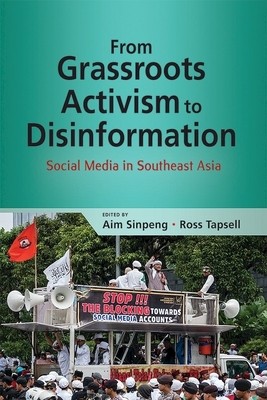
- We will send in 10–14 business days.
- Publisher: Iseas - Yusof Ishak Institute
- ISBN-10: 9814951021
- ISBN-13: 9789814951029
- Format: 15.2 x 22.9 x 1.2 cm, minkšti viršeliai
- Language: English
- SAVE -10% with code: EXTRA
From Grassroots Activism to Disinformation (e-book) (used book) | bookbook.eu
Reviews
Description
This book reflects on the role of social media in the past two decades in Southeast Asia. It traces the emergence of social media discourse in Southeast Asia, and its potential as a "liberation technology" in both democratizing and authoritarian states. It explains the growing decline in internet freedom and increasingly repressive and manipulative use of social media tools by governments, and argues that social media is now an essential platform for control. The contributors detail the increasing role of "disinformation" and "fake news" production in Southeast Asia, and how national governments are creating laws which attempt to address this trend, but which often exacerbate the situation of state control.
From Grassroots Activism to Disinformation explores three main questions: How did social media begin as a vibrant space for grassroots activism to becoming a tool for disinformation? Who were the main actors in this transition: governments, citizens or the platforms themselves? Can reformists "reclaim" the digital public sphere? And if so, how?EXTRA 10 % discount with code: EXTRA
The promotion ends in 23d.06:47:03
The discount code is valid when purchasing from 10 €. Discounts do not stack.
- Publisher: Iseas - Yusof Ishak Institute
- ISBN-10: 9814951021
- ISBN-13: 9789814951029
- Format: 15.2 x 22.9 x 1.2 cm, minkšti viršeliai
- Language: English English
This book reflects on the role of social media in the past two decades in Southeast Asia. It traces the emergence of social media discourse in Southeast Asia, and its potential as a "liberation technology" in both democratizing and authoritarian states. It explains the growing decline in internet freedom and increasingly repressive and manipulative use of social media tools by governments, and argues that social media is now an essential platform for control. The contributors detail the increasing role of "disinformation" and "fake news" production in Southeast Asia, and how national governments are creating laws which attempt to address this trend, but which often exacerbate the situation of state control.
From Grassroots Activism to Disinformation explores three main questions: How did social media begin as a vibrant space for grassroots activism to becoming a tool for disinformation? Who were the main actors in this transition: governments, citizens or the platforms themselves? Can reformists "reclaim" the digital public sphere? And if so, how?

Reviews